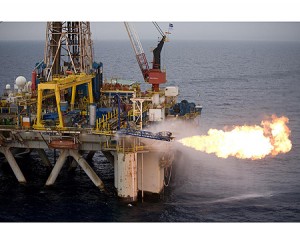 Israel is reported to be seeking to deploy fighter aircraft in Cyprus, its partner in developing a natural gas bonanza under the eastern Mediterranean, to protect the vital energy resources.
Israel is reported to be seeking to deploy fighter aircraft in Cyprus, its partner in developing a natural gas bonanza under the eastern Mediterranean, to protect the vital energy resources.
Turkey is seen as one of the main threats.
The move follows the announcement Sunday by the Noble Energy Co., of Houston and its Israeli partner the Delek Group, that they had made a new discovery off the Israeli coast that could contain 1.2 trillion-1.3 trillion cubic feet of gas.
Israel is already preparing to launch a major security operation to protect the offshore fields and the attendant facilities in its waters.
This will involve missile-armed patrol vessels, round-the-clock aerial surveillance by unmanned drones and other naval detachments, primarily to defend the energy zones against attack by Hezbollah, the Iranian-backed force in neighboring Lebanon.
Israel’s main gas zones, discovered by Noble in 2009-10, are the Leviathan field holding an estimated 16 tcf and the nearby Tamar field with 8 tcf. These are part of the Levant Basin which the U.S. Geological Survey reported in 2010 contains an estimated 122 tcf of natural gas and around 1.7 billion barrels of oil.
Israeli Prime Minister Binyamin Netanyahu is expected to ask the Cypriot government, which controls the southern two-thirds of the war-divided Mediterranean island, to allow Israeli air force combat jets to use the Andreas Papandreou air base outside the southwestern resort city of Paphos.
“It is unclear if the request will be to station a permanent presence on the island or to establish a base that could provide logistical support for the (air force) during operations in the region,” The Jerusalem Post’s military analyst Yaakov Katz reported.
Cyprus’ Famagusta Gazette newspaper said Tuesday that discussions about providing facilities for the Israeli air force are at “an exploratory stage.”
But Katz surmised that Israel’s objective is “to be able to more effectively protect the growing number of gas fields it is discovering in the Mediterranean.”
The prospect of the air force getting access to the Paphos base was heightened in December when Cypriot Defense Minister Demetris Eliades signed two military cooperation agreements with his Israeli counterpart, Ehud Barak, during a visit to Tel Aviv.
The Greek Cypriot government in Nicosia has no air force and only a miniscule naval force that’s heavily outgunned by the military might of Turkey, its longtime adversary to the north.
Eliades has made it clear the Israelis have approval “in advance” to operate in Cypriot air space and waters. Actually basing Israeli aircraft in southern Cyprus is guaranteed to rile the Turks.
Cyprus has launched its own gas exploration program in waters off its southern coast that abut the northern extremity of Israel’s Leviathan field.
Initial results, with Noble Energy handling the drilling, indicate the Greek Cypriots are sitting on an energy bonanza of their own.
Cyprus has been divided since Turkey invaded in 1974 after a short-lived coup by supporters of union with Greece. The Turks seized the northern third of the island and proclaimed it the Turkish Republic of Northern Cyprus. It is recognized only by Ankara.
Israel and Cyprus plan to pool resources and jointly export their gas through an underwater pipeline to the European Union via Greece.
Turkey says the Cypriots have no right to do that unilaterally, threatening a possible flare-up of the historic rivalry between the Turks and Greeks.
Ankara has dispatched warships and at least one seismic survey ship into the disputed zone and in 2011 stationed a squadron of F-16 fighter jets at a TRNC airbase.
Turkey is also at odds with Israel, its onetime strategic ally. It reversed the alliance in 2010 after the Israeli Navy killed nine Turks when intercepting a Turkish-run flotilla carrying humanitarian aid to the Israeli-blockaded Gaza Strip.
In recent weeks, Barak has pledged to upgrade Israel’s defense links with Greece as well.
Debt-ridden Greece, which is staring economic collapse in the face, is only too happy to hook up with a war-seasoned military power like the Israel to confound the Turks.
The Israeli air force has had joint exercises with the Greek air force in recent months.
Israel also faces threats from neighboring Lebanon, which also seeks to benefit from the energy boom. Beirut claims Israel is poaching on its territorial zone, which has yet to be demarcated by treaty.
UPI

Leave a Reply
You must be logged in to post a comment.